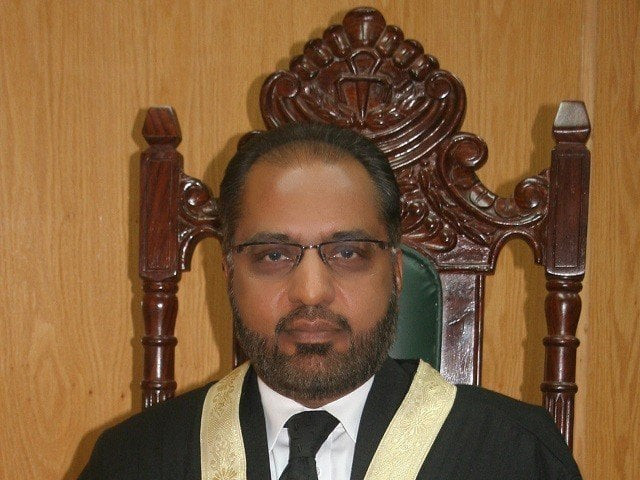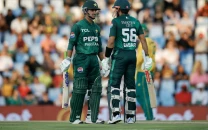IHC former judge regains his honour
SC overturns SJC’s October 2018 notification proposing Justice Siddiqui’s removal

In an unprecedented decision, the Supreme Court has overturned the Supreme Judicial Council (SJC)'s October 2018 notification, which led to the dismissal of Islamabad High Court (IHC) senior puisne judge Shaukat Aziz Siddiqui. The dismissal stemmed from serious allegations leveled by Siddiqui against a former spy chief.
Hearing Siddiqui’s appeal against his sacking, a five-judge larger bench led by Chief Justice of Pakistan (CJ) Qazi Faez Isa on Friday ruled that during the misconduct proceedings initiated against the former IHC judge, the SJC deprived him of his fundamental rights of fair trial and due process.
In his speech at Rawalpindi Bar Council on July 21, 2018, Justice Siddiqui had accused former Inter-Services Intelligence (ISI) chief Lt Gen Faiz Hameed and some other officials of trying to manipulate the IHC benches as well as the accountability courts that work under the high court.
Around a week after the event, the SJC initiated misconduct proceedings against the IHC judge for purportedly breaching the judge’s code of conduct. The council on October 11, 2018 recommended his removal.
The former judge later approached the apex court against the SJC order. However, his appeal against the council’s verdict was taken up only after Justice Isa assumed office as the chief justice of Pakistan.
A five-member bench led by Justice Isa heard the appeal and reserved its order on January 23.
On Friday, the bench unveiled its 23-page detailed order, setting aside the SJC’s October 11, 2018 report/opinion—submitted to the president and Notification No F.9(2)/2018-A.II, dated October 11, 2018 issued on the advice of the prime minister and his cabinet of ministers.
“Consequently, Justice Siddiqui shall be deemed to have retired as a judge of the IHC and he will be entitled to receive all the benefits and privileges due to a retired judge, by allowing these petitions in the above terms," said the order authored by CJ Isa.
The order noted that “unfortunately” the delay that occurred in hearing and deciding these petitions meant that in the interregnum Justice Siddiqui attained the age of sixty-two years, at which age a judge of the high court retires. Therefore, Justice Siddiqui cannot be restored to the position of judge.
The judgement said Justice Siddiqui had undoubtedly levelled very serious allegations against Gen Faiz Hameed and a few of his subordinates. However, Justice Siddiqui was not given an opportunity to establish his allegations nor was he brought face to face with those he had accused.
“When we noted this lapse we issued notices to all those against whom he made allegations and provided them with an opportunity to admit/deny them.
“All of them have denied their stated involvement. Therefore, it was all the more necessary for the SJC to have inquired into the matter and to have determined who was telling the truth,” it said.
According to the verdict, the SJC did not give any credence to Justice Siddiqui’s own words and to the contents of his replies; the SJC assumed that these allegations were false; and having made this assumption concluded that Justice Siddiqui was guilty of misconduct. It said it would be difficult to categorize such a determination as fair or one which accorded with the requirements of due process.
“Justice Siddiqui was not given an opportunity to establish the veracity of his allegations, which was incumbent on the SJC when the same formed the basis of Justice Siddiqui’s removal from office.”
The court noted that the fundamental rights enshrined in the Constitution include the right to a fair trial and due process (Article 10A) and all citizens, including judges, must be dealt with in accordance with it.
Read Ex-DG ISI summoned in IHC judge removal case
“However, Justice Siddiqui was deprived of his fundamental rights of fair trial and due process. Article 209 does not stipulate that in determining whether a judge is guilty of misconduct he is denuded of the fundamental rights nor permits the SJC to act contrary to them.”
It said in all prior cases when proceedings were initiated against judges which resulted in their removal from office it was done after the recording of evidence.
Evidence was recorded in the case of Justice Akhlaque Hussain before rendering the opinion that he should be removed from his office. In the case of Justice Shaukat Ali, the SJC recorded evidence of witnesses before formulating its opinion and recommending his removal.
And, in the recent case of Mazahar Ali Akbar Naqvi the SJC recorded the testimony of 14 witnesses, who produced a number of documents, opportunity to cross-examine the witnesses was granted, and only then did the SJC find that Naqvi was guilty of misconduct and should have been removed as a judge
"In not holding an inquiry, by not providing Justice Siddiqui an opportunity to establish his allegations and without recording of evidence, it cannot be stated that Justice Siddiqui had received a fair trial and that due process requirements were met,” it said.
The verdict said the former judge was also not dealt with in accordance with law, as prescribed by Article 4 of the Constitution and his reputation was tarnished.
"Transgressions the bar of jurisdiction contained in Article 211 of the Constitution would not be applicable in the instant case since the action, as it was taken, against Justice Siddiqui constituted mala fide and the SJC had acted coram non judice,” it said.
The verdict said if a judge is removed without even inquiring into the allegations levelled by or against him the independence of judiciary will receive a severe setback.
It said the SJC did not specify which particular provision or aspect of the said four Articles of the Code of Conduct, or of any other, Justice Siddiqui had violated and had persuaded the SJC to opine that he was guilty of misconduct.
"Justice Siddiqui had leveled serious allegations and these were noted in the impugned Report/Opinion which included that the then Major General Faiz Hameed, DG-C of ISI, and some of his subordinates had wanted cases ‘pertaining to Faizabad sit-in, BOL Media Group, AXACT’ and those of Mr. Muhammad Nawaz Sharif, former Prime Minister of Pakistan, and his daughter, Ms. Maryam Nawaz Sharif, to be decided in a particular manner.
“If the SJC after conducting an inquiry had determined that Justice Siddiqui had levelled false allegations he would have been guilty of misconduct, but without inquiring into the matter it could not be said that he had levelled false allegations,” it said.
The court said it could not be unmindful of the fact that two complaints—one from the then Chief of Army Staff and another from the Government of Pakistan—wanted “to initiate proper legal process to ascertain the veracity of the allegations and take action accordingly”.
“An inquiry was all the more necessary since neither the Chief of Army Staff’s Secretariat nor the Government of Pakistan had determined the veracity of the allegations. Justice Khosa too in his initial opinion had stated ‘that the matter requires an inquiry by the Supreme Judicial Council’,” it added.


















COMMENTS
Comments are moderated and generally will be posted if they are on-topic and not abusive.
For more information, please see our Comments FAQ